Sweden Advises Citizens Against Travel To Iran
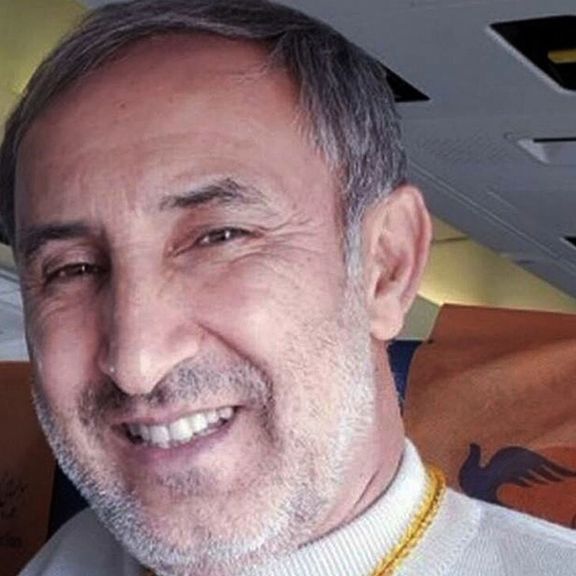
The Swedish Ministry of Foreign Affairs has advised citizens against non-essential travel to the Islamic Republic because of the security risks to foreigners.

The Swedish Ministry of Foreign Affairs has advised citizens against non-essential travel to the Islamic Republic because of the security risks to foreigners.
The statement by Stockholm was issued on Thursday after the Swedish prosecutors requested a life sentence for former Iranian prison guard, Hamid Noury (Nouri), on trial in Sweden for his role in the killings of thousands of prisoners in 1988.
Sweden is probably worried that Iran may detain Swedish citizens to have more bargaining chips for the release of Nouri, who was arrested in November 2019 while visiting Sweden and charged with war crimes for his role in the execution of up to 5,000 political prisoners. Sweden used the principal of universal jurisdiction to arrest and prosecute Noury, because the alleged crimes amounted to war crimes.
According to the ministry, this means travel advisory with the purpose of visiting or tourism will be valid until further notice and covers the whole country.
The statement said law enforcement’s activities and interpretation of the law may violate international norms in the Islamic Republic and foreign travelers can be arbitrarily detained and prosecuted without clear reasons.
A Swedish-Iran scientist Ahmad-Reza Djalai faces the death sentence in Iran after he was arrested on trumped-up charges of spying.
Sweden on March 10 deported back to Iran two alleged Iranian agentswho were arrested for links to a terrorist plot, instead of putting them on trial, since it does not want more tensions in its relations with Tehran.
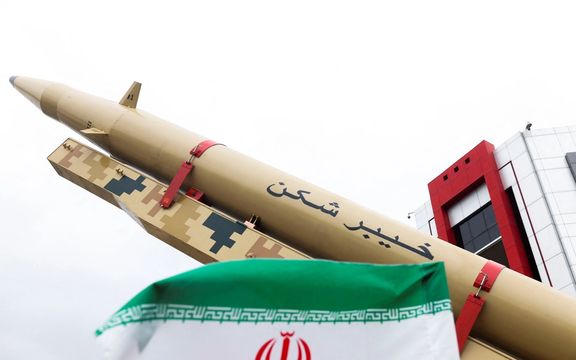
Government organized events took place in Iran on the Islamic Republic’s official Quds Day on Friday, with a range of ballistic missiles on public display.
Tasnim news website affiliated with the Revolutionary Guard said that the new "Kheybar Shekan" solid-fuel missile with a range of close to 1,500 kilometers was displayed for the second time this month.
The word Kheybar refers to an attack by early Muslims in 628 AD led by Prophet Muhammad on Jews living in Khaybar (Arabic pronunciation of Kheybar). The word Shekan means destoryer and Kheybar Shekan means "destroyer of Kheybar".
The ballistic missile Emad, with a range of 1,700 km was also paraded, as anti-Israeli banners installed by state organs covered major streets in Tehran and other cities.
Iran's Revolutionary Guards commander Hossein Salami said on Friday that Israel was creating conditions for its own destruction with its "evil actions".
"Stop your vicious deeds. You know well that we are people of action and reaction. Our responses are painful. You create conditions for your own destruction. We will not leave you alone. Wait [for us]," Salami said during Quds Day in Tehran.
"You know better than us what will befall you if you take evil action."
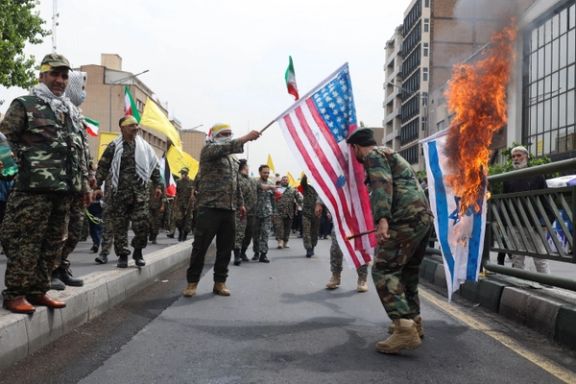
The Revolutionary Guard Intelligence Organzation chief Hossein Taeb, a cleric, referring to "resistence forces" and Palestinians said that "Quds…God willing, will be freed soon" and Iran knows that Israel is in fear. Zionists, he said, have reached "the edge of the abys."
Messagaes in similar state-organized events are also directed at the supporters of the régime and feed the coverage in media controlled by the government.
Taeb also said that the "supporter of the occupyer of Quds, Ameirca is not in a good state. The arrogant and dominating power of America is declining," he said, and added that American leaders are lost amid numerous domestic and foreign challenges. They cannot free themselves from the humiliating situation they face in West Asia, and other foreign powers who might want to fill America’s shoes should learn the leasson, Taeb said.
The head of IRGC intelligence went on to say that "We will not také away our gaze from the enemy," and will watch their every move.
The commander of IRGC’s extraterritoral Quds Force, Esmail Ghaani also told the crowd at he Tehran Friday Prayer that the founder of the Islamic Republic Ayatollah Ruhollah Khomeini always supported the Palestinians and the Islamic Republic in its four-decade history tried to follow his teachings to "liberate Palestine."
He then praised the Lebanese Hezbollah, created in the early 1980s with planning and support by Iran’s nascent régime. Ghaani warned that "children of the Islamic Republic are present all over the world," and have organized "resistence fronts" everywhere.
Tehran calls all militant forces and groups that follow its policies and receive support the "resistence front."
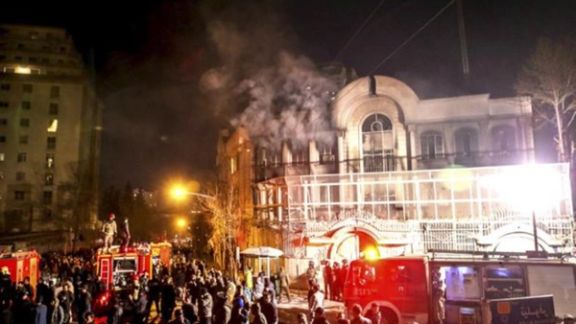
The Iranian envoy to Baghdad, where Theran and Riyadh have been holding talks, says that the two regional tivals have agreed to continue the diplomatic process.
"Both sides had proposals that led to an agreement after the meeting Thursday [April 23] over a road map for future [talks]," Iraj Masjedi said according to the official news agency IRNA's report Friday.
Masjedi said the re-opening of embassies still needed to be negotiated but added that the agreement in the latest round was important as both sides needed a framework for future talks.
Masjedi said some of the agreements reached on April 23 included "building trust", as well as cooperation over matters such as acceptance of Iranian pilgrims for hajj in Mecca, re-opening of embassies, and "regional and internationals issues" but did not elaborate on any of these topics.
Nour News, a website affiliated to the secretary of Iran's Supreme National Security Council (SNSC), Ali Shamkhani, reported April 23 that high-ranking Iraqi and Omani officials had played an important role in organizing the meeting between Iranian and Saudi officials in Baghdad. Tehran and Riyadh. According to Nour News, representatives of Iran’s Supreme National Security Council (SNSC) and Saudi Arabia’s intelligence chief, Khalid bin Ali Al Humaidan, had attended the talks.
In his weekly press briefing Monday, Iran's foreign ministry spokesman Saeed Khatibzadeh said the talks in Baghdad were "forward-looking and positive". He also told reporters that initial talks were underway between Tehran and Riyadh on acceptance of 40,000 Iranian pilgrims to Mecca this year.
Iraqi Foreign Minister Fuad Hussein has said the Saudi and Iranian sides reached agreement on a 10-point memorandum of understanding (MoU) during the fifth round of talks. “The Saudi-Iranian dialogue in Baghdad discussed the continuation of the ceasefire in Yemen”, he said, noting that this round of talks came at the request of Oman.
Predominantly Sunni Muslim Saudi Arabia and Shi'ite Iran started direct talks in Baghdad in April 2021 for possible rapprochement and held five rounds to resolve their differences and ease tensions in the Middle East where they have been supporting opposite sides but so far there has been no breakthrough.
Iran suspended the talks in March without giving a reason as a new round of talks was due to start. The suspension of talks came after Saudi Arabia executed 8, including 41 Saudi Shiites, in its biggest mass execution in decades.
They have been at odds particularly over Lebanon where the Iran-backed Hezbollah has grown its political power, and influence and Yemen where a Saudi-led coalition has been at war with Iran-backed Ansarallah, also known as the Houthis, since 2016.
Saudi Arabia has also repeatedly voiced concerns over Iran's nuclear program and its long-range ballistic missiles. The United States, its Western allies and others blame Iran’s drones and missiles for Houthi attacks on Saudi and Emirati energy facilities.
Riyadh severed ties with Tehran in January 2016 and expelled Iranian diplomat after mobs stormed the its embassy in Tehran and its consulate in Mashhad in protest to the Saudi's execution of a Shi'ite cleric, Shaikh Nimr al-Nimr.
Protesters ransacked and set fire to embassy offices. Iran has never officially apologized for the incident. Then-president Hassan Rouhani, however, in a speech in June 2021 accused his hardliner rivals of sabotaging relations with Saudi Arabia by attacking the Saudi diplomatic missions. "May God never forgive those who did not let our relations with some neighbors improve," he said.
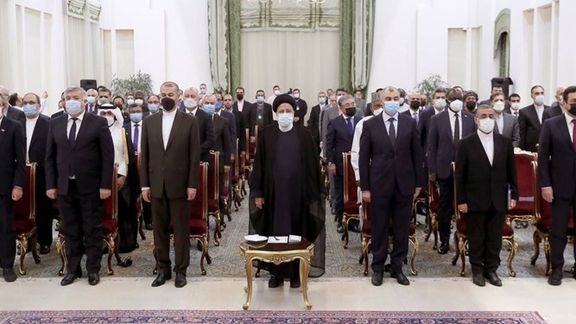
Islamic countries should be aware of Israel’s "evil intentions" Iran’s president Ebrahim Raisi told ambassadors of Islamic countries at a reception on Thursday.
Those Muslim countries that "normalize relations with the blood-shedding Zionist regime resemble those who would keep a snake in their sleeves," Raisi said, as envoys were invited to mark the end of the Muslim month of Ramadan, ending on Friday in Iran.
Every year during Ramadan Iran marks the Quds or Jerusalem Day to highlight its support for Palestinians and its enmity with Israel.
Raisi who highlighted Muslim unity in his speech, without naming any country, was implicitly criticizing the United Arab Emirates, Bahrain and other Arab countries that have signed normalization agreements with Israel. He claimed that establishing ties with Israel will anger two billion Muslims in the world.
Since August 2020, when the UAE and Bahrain signed the Abraham accords with Israel, with the mediation of the United States, mainly Iran has criticized their action. Other Arab countries such as Egypt and Morocco also have normal ties with Israel.
Raisi also compared Israel with fundamentalist Sunni Muslim extremists that he called Takfiris and said that if Muslim youth had not resisted, Israel "like Takfiris would have swallowed regional countries."
Iran financially and militarily supports an array of Palestinian and other groups who conduct attacks against Israel.
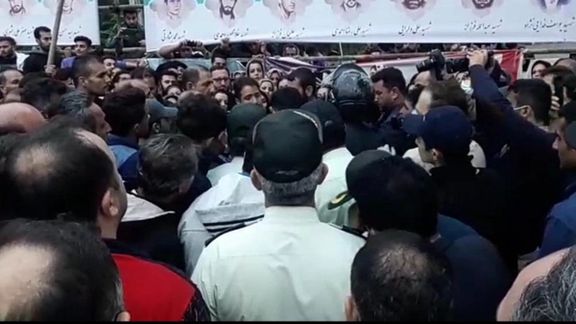
Iran’s anti-riot police cracked down on people peacefully protesting unsanitary dumping of waste at a local landfill in northern Iran.
A group of residents of the village of Saravan in Iran’s northern Gilan province started a peaceful protest on Thursday, but after police intervention, protesters began throwing stones. Five officers were injured and several protesters arrested.
According to videos circulating inthe socialmedia police used guns and teargas during the clashes.
Furious at the failure of the local authorities to close the gigantic waste landfill, people had been blocking the entrance of the garbage dump for more than two weeks to stop trash trucks from reaching the site.
Piles of stinking rubbish at the Saravan site now tower some 90 meters (295 feet) high, and according to estimates the volume of the waste exceeds one million tons while about a thousand tons is added to it daily.
Waste from the provincial capital Rasht and seven other cities has been dumped there for nearly four decades.
Protesters say the landfill, reportedly due to close next year, is causing diseases and health problems, and demand the site be closed immediately.
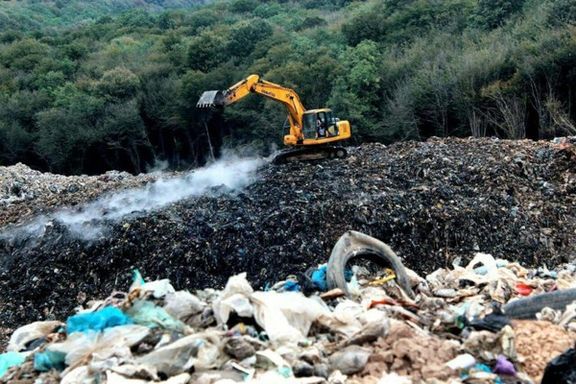
According to reports, officials have been promising to solve this problem for years but none of their pledges have been fulfilled so far.
The spokesman for Gilan province's waste management office, Javad Shafi'i, told the state broadcaster that some $4 million had been allocated to resolve the issue, including funding a "fertilizer and incinerator plant".
A report by Tehran Times newspaper said that poor waste management is causing environmental damage of around $1.7 billion annually.
Recently, Iran has seen several demonstrations over government mismanagement of environmental issues like the country's water crisis or building factories in natural heritage sites.
Earlier in April, a group of residents held a protest rally in southwest Iran against a project to transfer water out of Chaharmahal-Bakhtiari province, causing water scarcity in their region.
During the protest in the provincial capital of Shahrekord, people carried placards and chanted slogans threatening to take up arms against the ‘mafia’ behind the redistribution project.
Chaharmahal-Bakhtiari, a traditionally water-rich region in the Zagros mountains, has seen its water resources decline due to both drought and projects to irrigate other arid regions.
Iran has been suffering from drought for at least a decade and this year officials have been warning of a further decrease in precipitation.
Moreover, controversy over an environmentally dangerous petrochemical project continues in Iran as some government officials have defended it despite an earlier ban.
The petrochemical plant in Miankaleh, northern Iran is planned to be built next to a nature reserve, which galvanized opposition by activists and citizens in the past few weeks. President Ebrahim Raisi came out against the project earlier this month and Iran’s Judiciary issued an order to stop construction until further studies.
However, the governor of Mazandaran province and the Friday Prayer Imam of the region strongly defended the project. The government of former president Hassan Rouhani in an apparently hasty move approved the petrochemical project last year and it obtained the oil ministry’s permission in an unusually fast-tracked manner.
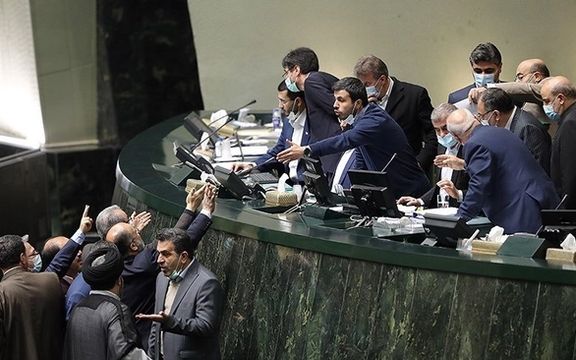
Speaking to Persian-language media funded by "hostile governments" and overseas opposition groups would be deemed espionage under draft legislation in Iran.
The Legal Bureau of the Iranian Parliament's Research Center has drawn up legislation stipulating that Iranian citizens should cooperate with such media outlets only if they can thereby defend the "entity of Islamic Republic."
The draft bill entitled "Raising Punishment for Espionage and Collaboration with Hostile Governments" redefines and broadens the concepts of "espionage" and "hostile government" and criminalizes any cooperation with foreign think-tanks, media, and even charities of "hostile countries".
"Any group, organization or government that is in war with the Islamic Republic, seeks to overthrow it, or takes actions that endanger Iran's national security" − including assisting United States sanctions or exerting economic damage on Iran − would be considered "hostile."
As examples of such media outlets, the draft bill names the BBC, the United States-funded Voice of America, and the London-based TV channels Manoto TV and Iran International.
Sending video footage, audio files, photos, or any data to such media could be considered collaboration with enemies, espionage, or 'corruption on earth,' and thereby punishable by sentences including the death penalty.
Foreign-based opposition media and those affiliated to foreign governments considered hostile, including BBC Persian, are not permitted to maintain offices or post correspondents to Iran. They instead use reports, photos, and video-footage sent through social messaging. Anyone working or cooperating with the named outlets would be required to end their relationship within a month of the bill entering law.
In recent years, Iranian journalists working overseas, including for Iran International, and their family members in Iran have reported harassment and intimidation by security and intelligence bodies, including in the countries where they live and work.
In February the BBC filed a complaint to the United Nations over what it said was harassment of journalists in its Persian-language channels and their families including the freezing of their assets in Iran.
Variety of channels
While the Iranian government has a monopoly on terrestrial broadcasting, Iranians have for at least two decades accessed satellite television channels. The Persian-language channels of the BBC and Voice of America claim a significant audience.
The state broadcaster, Islamic Republic of Iran Broadcasting (IRIB), runs a variety of radio and television channels including several for foreign audiences including the English-language Press TV and Al Alam in Arabic and several other channels in Spanish, French and other languages.
An opinion survey conducted by the state-run Iranian Students Polling Agency (ISPA) in September 2021 found that the of IRIB viewership news had declined since 2016, with its popularity falling between March and September 2021 from 57.7 percent to 42.1 percent.
The Paris-based Reporters Without Borders (RSF) ranked Iran 174 in its 2021 World Press Freedom Index, a measure of freedom experienced by journalists in the country. This put Iran behind Syria and just ahead of Vietnam. RSF has described Iran as one of the world's biggest jailers of journalists.